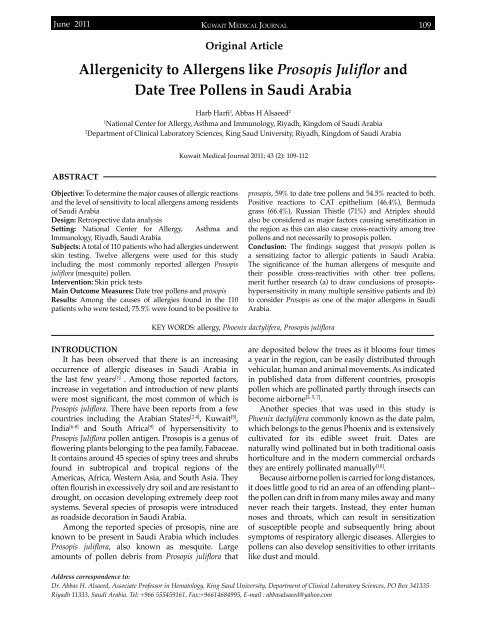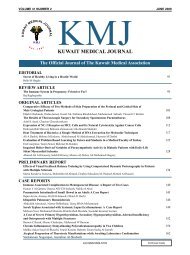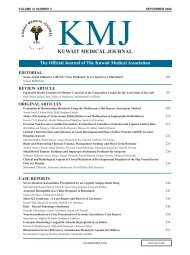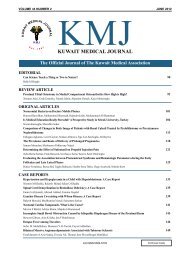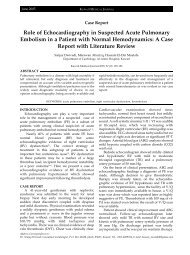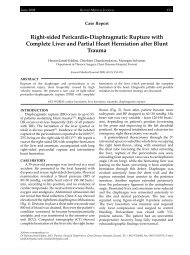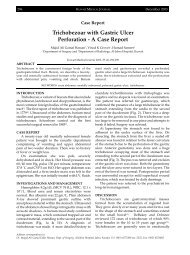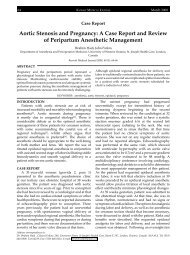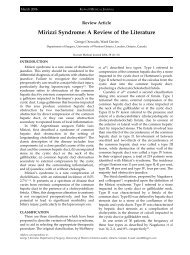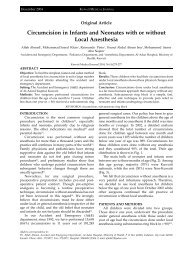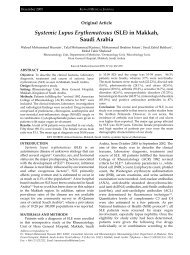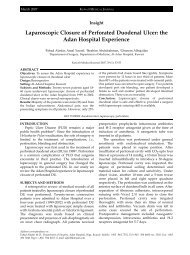Vol 43 # 2 June 2011 - Kma.org.kw
Vol 43 # 2 June 2011 - Kma.org.kw
Vol 43 # 2 June 2011 - Kma.org.kw
Create successful ePaper yourself
Turn your PDF publications into a flip-book with our unique Google optimized e-Paper software.
<strong>June</strong> <strong>2011</strong><br />
KUWAIT MEDICAL JOURNAL 109<br />
Original Article<br />
Allergenicity to Allergens like Prosopis Juliflor and<br />
Date Tree Pollens in Saudi Arabia<br />
Harb Ha , Abbas H Alsaeed 2<br />
1<br />
National Center for Allergy, Asthma and Immunology, Riyadh, Kingdom of Saudi Arabia<br />
2<br />
Department of Clinical Laboratory Sciences, King Saud University, Riyadh, Kingdom of Saudi Arabia<br />
Kuwait Medical Journal <strong>2011</strong>; <strong>43</strong> (2): 109-112<br />
ABSTRACT<br />
Objective: To determine the major causes of allergic reactions<br />
and the level of sensitivity to local allergens among residents<br />
of Saudi Arabia<br />
Design: Retrospective data analysis<br />
Setting: National Center for Allergy, Asthma and<br />
Immunology, Riyadh, Saudi Arabia<br />
Subjects: A total of 110 patients who had allergies underwent<br />
skin testing. Twelve allergens were used for this study<br />
including the most commonly reported allergen Prosopis<br />
juliflora (mesquite) pollen.<br />
Intervention: Skin prick tests<br />
Main Outcome Measures: Date tree pollens and prosopis<br />
Results: Among the causes of allergies found in the 110<br />
patients who were tested, 75.5% were found to be positive to<br />
prosopis, 59% to date tree pollens and 54.5% reacted to both.<br />
Positive reactions to CAT epithelium (46.4%), Bermuda<br />
grass (66.4%), Russian Thistle (71%) and Atriplex should<br />
also be considered as major factors causing senstitization in<br />
the region as this can also cause cross-reactivity among tree<br />
pollens and not necessarily to prosopis pollen.<br />
Conclusion: The findings suggest that prosopis pollen is<br />
a sensitizing factor to allergic patients in Saudi Arabia.<br />
The significance of the human allergens of mesquite and<br />
their possible cross-reactivities with other tree pollens,<br />
merit further research (a) to draw conclusions of prosopishypersensitivity<br />
in many multiple sensitive patients and (b)<br />
to consider Prosopis as one of the major allergens in Saudi<br />
Arabia.<br />
KEY WORDS: allergy, Phoenix dactylifera, Prosopis juliflora<br />
INTRODUCTION<br />
It has been observed that there is an increasing<br />
occurrence of allergic diseases in Saudi Arabia in<br />
the last few years [1] . Among those reported factors,<br />
increase in vegetation and introduction of new plants<br />
were most significant, the most common of which is<br />
Prosopis juliflora. There have been reports from a few<br />
countries including the Arabian States [2-4] , Kuwait [5] ,<br />
India [6-8] and South Africa [9] of hypersensitivity to<br />
Prosopis Juliflora pollen antigen. Prosopis is a genus of<br />
flowering plants belonging to the pea family, Fabaceae.<br />
It contains around 45 species of spiny trees and shrubs<br />
found in subtropical and tropical regions of the<br />
Americas, Africa, Western Asia, and South Asia. They<br />
often flourish in excessively dry soil and are resistant to<br />
drought, on occasion developing extremely deep root<br />
systems. Several species of prosopis were introduced<br />
as roadside decoration in Saudi Arabia.<br />
Among the reported species of prosopis, nine are<br />
known to be present in Saudi Arabia which includes<br />
Prosopis juliflora, also known as mesquite. Large<br />
amounts of pollen debris from Prosopis juliflora that<br />
are deposited below the trees as it blooms four times<br />
a year in the region, can be easily distributed through<br />
vehicular, human and animal movements. As indicated<br />
in published data from different countries, prosopis<br />
pollen which are pollinated partly through insects can<br />
become airborne [3, 5, 7] .<br />
Another species that was used in this study is<br />
Phoenix dactylifera commonly known as the date palm,<br />
which belongs to the genus Phoenix and is extensively<br />
cultivated for its edible sweet fruit. Dates are<br />
naturally wind pollinated but in both traditional oasis<br />
horticulture and in the modern commercial orchards<br />
they are entirely pollinated manually [10] .<br />
Because airborne pollen is carried for long distances,<br />
it does little good to rid an area of an offending plant--<br />
the pollen can drift in from many miles away and many<br />
never reach their targets. Instead, they enter human<br />
noses and throats, which can result in sensitization<br />
of susceptible people and subsequently bring about<br />
symptoms of respiratory allergic diseases. Allergies to<br />
pollens can also develop sensitivities to other irritants<br />
like dust and mould.<br />
Address correspondence to:<br />
Dr. Abbas H. Alsaeed, Associate Professor in Hematology, King Saud University, Department of Clinical Laboratory Sciences, PO Box 341335<br />
Riyadh 11333, Saudi Arabia. Tel: +966 555459161, Fax:+96614684995, E-mail : abbasalsaeed@yahoo.com


